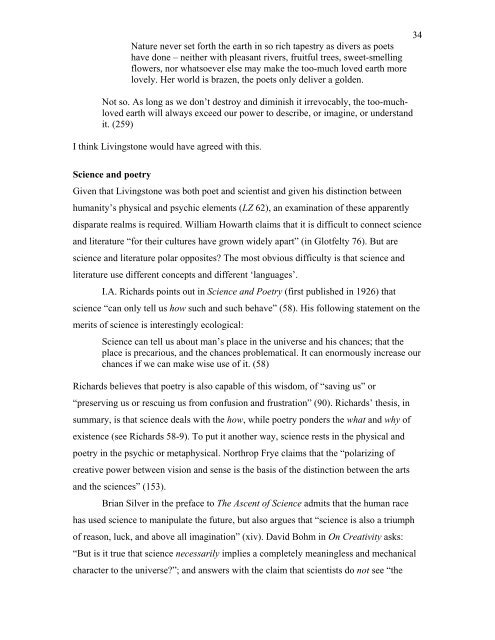"Symbiosis or Death": - Rhodes University
"Symbiosis or Death": - Rhodes University
"Symbiosis or Death": - Rhodes University
Create successful ePaper yourself
Turn your PDF publications into a flip-book with our unique Google optimized e-Paper software.
Nature never set f<strong>or</strong>th the earth in so rich tapestry as divers as poets<br />
have done – neither with pleasant rivers, fruitful trees, sweet-smelling<br />
flowers, n<strong>or</strong> whatsoever else may make the too-much loved earth m<strong>or</strong>e<br />
lovely. Her w<strong>or</strong>ld is brazen, the poets only deliver a golden.<br />
Not so. As long as we don’t destroy and diminish it irrevocably, the too-muchloved<br />
earth will always exceed our power to describe, <strong>or</strong> imagine, <strong>or</strong> understand<br />
it. (259)<br />
I think Livingstone would have agreed with this.<br />
Science and poetry<br />
Given that Livingstone was both poet and scientist and given his distinction between<br />
humanity’s physical and psychic elements (LZ 62), an examination of these apparently<br />
disparate realms is required. William Howarth claims that it is difficult to connect science<br />
and literature “f<strong>or</strong> their cultures have grown widely apart” (in Glotfelty 76). But are<br />
science and literature polar opposites? The most obvious difficulty is that science and<br />
literature use different concepts and different ‘languages’.<br />
I.A. Richards points out in Science and Poetry (first published in 1926) that<br />
science “can only tell us how such and such behave” (58). His following statement on the<br />
merits of science is interestingly ecological:<br />
Science can tell us about man’s place in the universe and his chances; that the<br />
place is precarious, and the chances problematical. It can en<strong>or</strong>mously increase our<br />
chances if we can make wise use of it. (58)<br />
Richards believes that poetry is also capable of this wisdom, of “saving us” <strong>or</strong><br />
“preserving us <strong>or</strong> rescuing us from confusion and frustration” (90). Richards’ thesis, in<br />
summary, is that science deals with the how, while poetry ponders the what and why of<br />
existence (see Richards 58-9). To put it another way, science rests in the physical and<br />
poetry in the psychic <strong>or</strong> metaphysical. N<strong>or</strong>throp Frye claims that the “polarizing of<br />
creative power between vision and sense is the basis of the distinction between the arts<br />
and the sciences” (153).<br />
Brian Silver in the preface to The Ascent of Science admits that the human race<br />
has used science to manipulate the future, but also argues that “science is also a triumph<br />
of reason, luck, and above all imagination” (xiv). David Bohm in On Creativity asks:<br />
“But is it true that science necessarily implies a completely meaningless and mechanical<br />
character to the universe?”; and answers with the claim that scientists do not see “the<br />
34

















